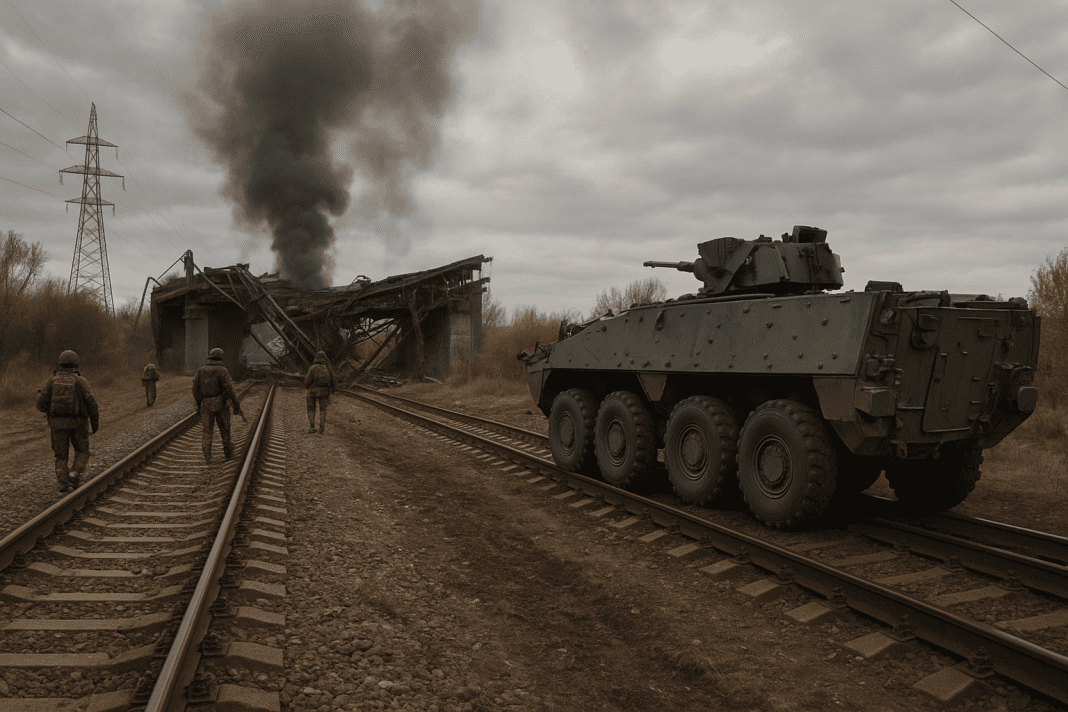Poland has taken dramatic steps following a rail blast that disrupted a key supply route to Ukraine over the weekend. The country accused Russia of carrying out “an act of state terrorism” and announced the deployment of 10,000 soldiers to protect critical infrastructure. Officials also said they would close Russia’s last remaining consulate in the northern city of Gdansk, signaling a strong response to the incident.
Massive Troop Deployment After Rail Blast to Protect Infrastructure
The Polish Defense Ministry launched Operation Horyzont, sending 10,000 soldiers to work alongside internal security services to safeguard vital facilities, including railways, energy networks, and other strategic infrastructure. According to military officials, the troops will use advanced military equipment and artificial intelligence tools to strengthen protection against potential attacks.
Meanwhile, authorities believe the rail blast was carefully planned. Early on, reports indicate that the attack may have been carried out remotely using mobile phones. So far, investigators have seized SIM cards, and preliminary evidence suggests the suspects entered Poland from Belarus in the fall and then left the country after the explosion.
The rail blast damaged tracks on the Warsaw-Lublin route, a critical path used to deliver aid and supplies to Ukraine. Polish officials called the incident unprecedented, describing it as more than sabotage. They warned that the intention behind the rail blast was clearly to cause human casualties, raising the stakes for national security.
Closure of Russian Consulate and Diplomatic Response After Rail Blast
Polish authorities announced that they would close Russia’s consulate in Gdansk, leaving only the Russian embassy in Warsaw as the country’s sole diplomatic outpost in Poland. The move comes amid escalating tensions between Warsaw and Moscow.
Polish leaders emphasized that the response would go beyond diplomatic measures, signaling a robust stance against attacks on the nation. Security services have already begun making arrests, including individuals suspected of carrying out the rail blast. Authorities identified two foreign nationals believed to have acted under orders from Russia and four local accomplices who remained in Poland.
Undersea Espionage? Sanctioned Russian Ship Caught Lurking Near Vital Poland-Sweden Power Cable
The incident marks the most direct confrontation between Russia and a NATO member since September, when Russian drones entered Polish airspace and were shot down by NATO forces. Kremlin officials dismissed the allegations, labeling them as unfounded and a result of anti-Russian sentiment.
Rising Tensions Across Europe and Ukraine
The rail blast coincided with deadly Russian attacks in Ukraine. Meanwhile, missile and drone strikes killed at least 25 people in a western Ukrainian city, including three children, and injured dozens more. In response, Poland scrambled fighter jets, and German and Romanian aircraft joined to monitor and protect the skies.
The Russian military said it targeted military deployment sites, energy infrastructure, and railway networks. At the same time, European leaders expressed concern over the growing threat to infrastructure across the continent. They urged countries to reinforce protections and prepare for potential hybrid attacks, which attackers are increasingly making sophisticated and harder to attribute.
Polish authorities took full responsibility for determining the origin of the rail blast. Additionally, European officials planned to discuss the blast among EU foreign ministers, emphasizing the risk such incidents pose to transport and logistics networks across Europe.
NATO’s drone wall begins — Poland and Romania deploy Merops to hunt Russian intruders
Ukrainian leaders condemned the attacks, stating that continued pressure and international support are essential to deter further aggression. NATO officials confirmed they are closely monitoring developments and remain in communication with Polish authorities as the investigation unfolds.
The combination of military, diplomatic, and security responses highlights the gravity of the situation. Overall, Poland’s swift action—including deploying tens of thousands of troops and shutting down a consulate—demonstrates the seriousness with which the country is treating attacks like the rail blast on its territory and critical infrastructure.

